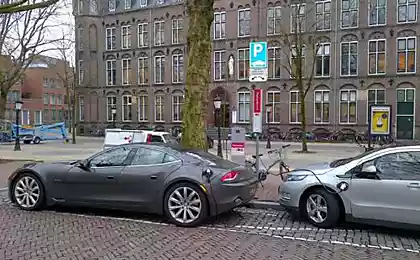687
Is there a future for electric vehicles?
The paradox
on wheels Electric - a real paradox on wheels: the efforts of advertisers in the mass consciousness it has acquired cult status. The ability to charge the car from the outlet almost perceived as the invention of perpetual motion, heralding the imminent end of the era of gasoline. Meanwhile, all of the technologies of the future, prepodnosyaschihsya as an innovative breakthrough in the car battery - the oldest, if not the oldest development
.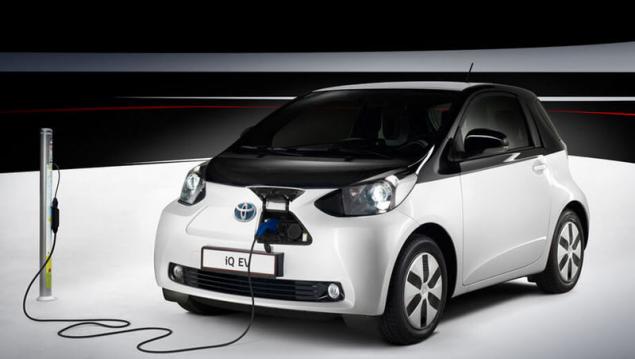
Against this background an ordinary internal combustion engine (ICE) - almost a novelty, since the first electric car was created in 1841, and at the beginning of the twentieth century there was a genuine flowering of this technology: the roads traveled electrical stagecoaches and wagons, and the famous New York taxi entirely composed of electric cars.
Why is a paradise of contemporary ecologist turned nightmare gasoline Fall? The fact that over 175 years of rechargeable battery could not reach the energy density comparable with combustible fuel. Mileage in electric vehicles is still small, but they have to be charged for a long time.
In question and the main advantage - environmentally friendly: Electricity is not taken out of thin air. The government of Singapore has recently fined the owner of the Tesla Model S, counting the amount of carbon dioxide generated by power plants in the process of charging the battery. It turned out that each kilometer traveled Tesla manages in 222 grams of carbon dioxide, while the index of the ordinary small car - 100-150 grams
.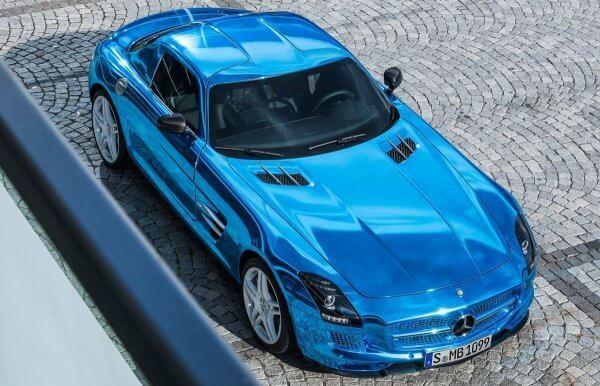
These shortcomings, coupled with the high cost limit the scope of electric vehicles. Despite the aura of prestige, their sales are low: according to a study by J. D. Power, only 2 percent of Americans are willing to buy electric. Another survey, conducted by McKinsey & amp;. Co, shows that 33 per cent of owners of electric vehicles disappointed purchase. Even the icon of the modern environmental movement-electric - the company Tesla Motors - finished 2015 with a loss of 889 million dollars
. Future batteries on
Instead of thinking how to cover the losses from falling demand for gasoline, states, including Russia, have to rack their brains over how to transplant citizens for electric machines. For alternative "clean" fuels such as methane or synthetic diesel produced by the bacteria are too utopian, and the need for a zero-emissions is real, especially for the inhabitants of megacities.
Let electropenalties smoke on a par with petrol engines, but they do so indirectly, but vehicles with internal combustion engines pollute the air where the ride: in large cities and 80 per cent of emissions falls on transport. According to the Ministry of Health estimated that only in Moscow of toxins and carcinogens contained in gasoline exhaust, die each year up to three and a half thousand people.
The disastrous state of the atmosphere of megacities forcing authorities in many countries to stimulate demand for electric vehicles: so, in Beijing and Shanghai buyers return of the cost of the machine, they are also allowed to ride on the dedicated lanes for public transport
.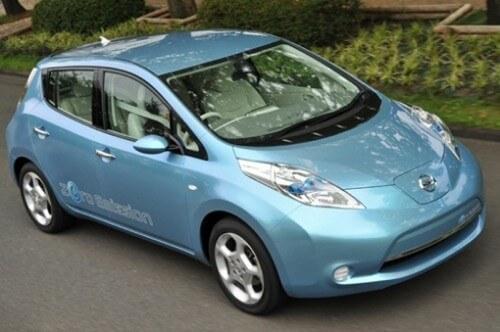
Authorities in London are encouraging owners of electric free parking and travel to the city center; Paris City Hall offers a free rental of electric vehicles - however, up to 30 minutes. In Tokyo, there are incentives for owners to dispose of old machines. In Italy and Switzerland for the introduction of electric approached more radical: in Florence to use gasoline-powered vehicles are only entitled to the locals, and in the Swiss town of Zermatt is completely banned cars with internal combustion engines
. Everywhere electrotransport using utilities - everywhere, where the route is defined and there are no problems with charging. For example, in Rome electric vehicles replaced the traditional horse-drawn carriages: animal welfare advocates were outraged that the horses have to work on polluted streets
. Electric cars in Russia
We have a process of "electrification" has only just begun: in 2014 zeroed import duties on electric vehicles that significantly reduce their costs. A year later, in Sochi earned the first electric taxi, transporting visitors to the airport and railway station, as well as a specially designed route in the area of the Olympic Park and Adler. Most likely, in the coming years will be similar ekomarshruty and other local resorts, such as the Crimea.
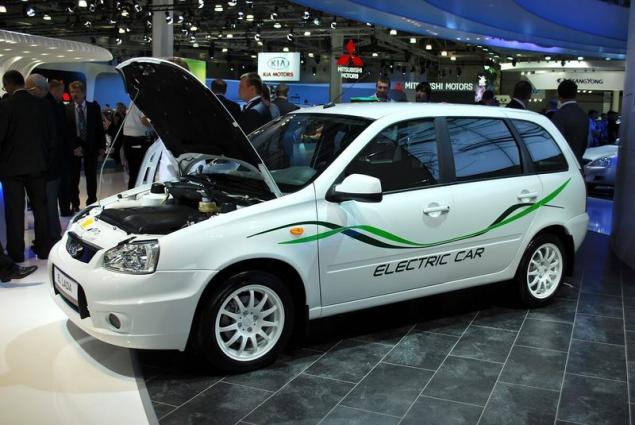
Until the end of 2016 in the capital as part of an agreement with the government energy companies "MOEK-EV» will create a network of charging stations - 200 stations, six of chargers will earn in the suburbs. Of course, this is not enough for widespread use of electric Muscovites, but urban services, such as traffic management Center (TSODD), have already started to buy electric cars.
The incentive for the purchase of electric cars will be the further development of the paid parking zone: parking is free for them. Savings capital owners of electric right now is 250 thousand rubles a year - the price of a parking season ticket within the Third Ring Road. Thus, the car pays for itself in about five years of ownership - without saving on gasoline
. Electric cars may not be the main mode of transport in the near future, but for limited use in cities and special environmental areas they are suitable, and even preferred. So we can expect a gradual growth of the market of electric cars in Russia with the development of a charging infrastructure: while there are only about a thousand, but by 2020, experts predict that the number of cars on the battery will increase to 50 thousand.
on wheels Electric - a real paradox on wheels: the efforts of advertisers in the mass consciousness it has acquired cult status. The ability to charge the car from the outlet almost perceived as the invention of perpetual motion, heralding the imminent end of the era of gasoline. Meanwhile, all of the technologies of the future, prepodnosyaschihsya as an innovative breakthrough in the car battery - the oldest, if not the oldest development
.

Against this background an ordinary internal combustion engine (ICE) - almost a novelty, since the first electric car was created in 1841, and at the beginning of the twentieth century there was a genuine flowering of this technology: the roads traveled electrical stagecoaches and wagons, and the famous New York taxi entirely composed of electric cars.
Why is a paradise of contemporary ecologist turned nightmare gasoline Fall? The fact that over 175 years of rechargeable battery could not reach the energy density comparable with combustible fuel. Mileage in electric vehicles is still small, but they have to be charged for a long time.
In question and the main advantage - environmentally friendly: Electricity is not taken out of thin air. The government of Singapore has recently fined the owner of the Tesla Model S, counting the amount of carbon dioxide generated by power plants in the process of charging the battery. It turned out that each kilometer traveled Tesla manages in 222 grams of carbon dioxide, while the index of the ordinary small car - 100-150 grams
.

These shortcomings, coupled with the high cost limit the scope of electric vehicles. Despite the aura of prestige, their sales are low: according to a study by J. D. Power, only 2 percent of Americans are willing to buy electric. Another survey, conducted by McKinsey & amp;. Co, shows that 33 per cent of owners of electric vehicles disappointed purchase. Even the icon of the modern environmental movement-electric - the company Tesla Motors - finished 2015 with a loss of 889 million dollars
. Future batteries on
Instead of thinking how to cover the losses from falling demand for gasoline, states, including Russia, have to rack their brains over how to transplant citizens for electric machines. For alternative "clean" fuels such as methane or synthetic diesel produced by the bacteria are too utopian, and the need for a zero-emissions is real, especially for the inhabitants of megacities.
Let electropenalties smoke on a par with petrol engines, but they do so indirectly, but vehicles with internal combustion engines pollute the air where the ride: in large cities and 80 per cent of emissions falls on transport. According to the Ministry of Health estimated that only in Moscow of toxins and carcinogens contained in gasoline exhaust, die each year up to three and a half thousand people.
The disastrous state of the atmosphere of megacities forcing authorities in many countries to stimulate demand for electric vehicles: so, in Beijing and Shanghai buyers return of the cost of the machine, they are also allowed to ride on the dedicated lanes for public transport
.

Authorities in London are encouraging owners of electric free parking and travel to the city center; Paris City Hall offers a free rental of electric vehicles - however, up to 30 minutes. In Tokyo, there are incentives for owners to dispose of old machines. In Italy and Switzerland for the introduction of electric approached more radical: in Florence to use gasoline-powered vehicles are only entitled to the locals, and in the Swiss town of Zermatt is completely banned cars with internal combustion engines
. Everywhere electrotransport using utilities - everywhere, where the route is defined and there are no problems with charging. For example, in Rome electric vehicles replaced the traditional horse-drawn carriages: animal welfare advocates were outraged that the horses have to work on polluted streets
. Electric cars in Russia
We have a process of "electrification" has only just begun: in 2014 zeroed import duties on electric vehicles that significantly reduce their costs. A year later, in Sochi earned the first electric taxi, transporting visitors to the airport and railway station, as well as a specially designed route in the area of the Olympic Park and Adler. Most likely, in the coming years will be similar ekomarshruty and other local resorts, such as the Crimea.

Until the end of 2016 in the capital as part of an agreement with the government energy companies "MOEK-EV» will create a network of charging stations - 200 stations, six of chargers will earn in the suburbs. Of course, this is not enough for widespread use of electric Muscovites, but urban services, such as traffic management Center (TSODD), have already started to buy electric cars.
The incentive for the purchase of electric cars will be the further development of the paid parking zone: parking is free for them. Savings capital owners of electric right now is 250 thousand rubles a year - the price of a parking season ticket within the Third Ring Road. Thus, the car pays for itself in about five years of ownership - without saving on gasoline
. Electric cars may not be the main mode of transport in the near future, but for limited use in cities and special environmental areas they are suitable, and even preferred. So we can expect a gradual growth of the market of electric cars in Russia with the development of a charging infrastructure: while there are only about a thousand, but by 2020, experts predict that the number of cars on the battery will increase to 50 thousand.
Is there life after 30 - an impressive sample of the collective wisdom
RICOL Healing -Unique method of disease treatment



